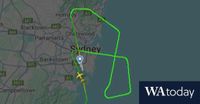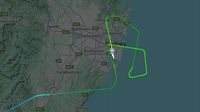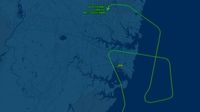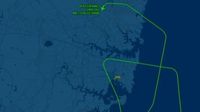A cargo plane made an emergency landing at Sydney Airport in the early hours of Tuesday morning, April 8, 2025, after issuing a mayday call due to a mechanical issue. The aircraft, which took off from Melbourne, landed safely at approximately 3:30 AM.
The incident unfolded when the pilot, facing a mechanical problem, performed several laps above Sydney Airport before making the distress call. During this time, the plane circled the airport for about 30 minutes, ensuring a safe approach for landing. The pilot's urgent message was clear: "We have to land as soon as possible, mayday, mayday, mayday," which was captured in an audio recording of the distress call.
According to officials, the cargo plane did not breach Sydney's overnight curfew, which prohibits landings between 11 PM and 6 AM for passenger flights. However, since this was a freighter service operated by ASL Airlines Australia, it was not subject to those restrictions. Air Services Australia instructed the pilots to declare a mayday, allowing them to make an approach and land without incident.
Sydney Airport confirmed that the plane landed safely and subsequently departed for its next destination, Brisbane. The freighter service, which has a Qantas tail number, is entirely operated by ASL Airlines, which has been noted for its reliable service in the region.
This incident highlights the complexities of aviation operations, especially during curfew hours. It raises questions about the protocols in place for emergency landings and the measures taken to ensure passenger safety during unforeseen circumstances. Aviation experts emphasize the importance of pilots being trained for such emergencies, allowing them to respond effectively under pressure.
Emergency landings, while rare, are a critical aspect of aviation safety. Pilots undergo rigorous training to handle various emergency scenarios, ensuring that they can maintain calm and make informed decisions when faced with mechanical failures or other challenges mid-flight. In this case, the pilot's quick thinking and adherence to protocol likely prevented a more serious situation.
The flight from Melbourne to Sydney is a common route, typically taking about an hour, and is crucial for cargo transport across Australia. The ASL Airlines service plays a vital role in maintaining the supply chain, especially for time-sensitive deliveries. The successful emergency landing serves as a reminder of the resilience and preparedness of airline crews.
In the wake of this incident, ASL Airlines has been contacted for further comment on the mechanical issue that prompted the mayday call. The airline's response will be important in understanding the nature of the problem and ensuring that similar incidents do not occur in the future.
As air travel continues to be an essential mode of transportation for both passengers and cargo, incidents like these underscore the importance of safety measures and the effectiveness of emergency protocols. The aviation industry is continually evolving, with advancements in technology and training aimed at minimizing risks and enhancing safety for all flights.
In conclusion, the emergency landing of the ASL Airlines cargo plane at Sydney Airport serves as a testament to the professionalism of the flight crew and the effectiveness of aviation safety protocols. While mechanical issues can pose significant challenges, the successful resolution of this situation highlights the importance of preparedness and training in the aviation industry.









